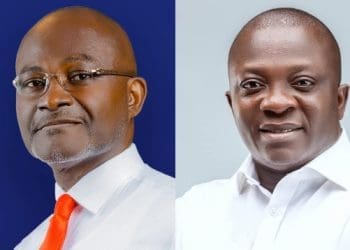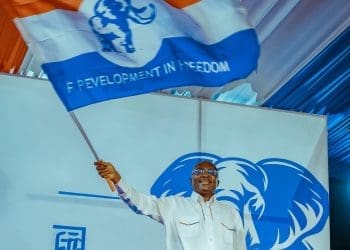The New Patriotic Party (NPP) is set to hold its highly anticipated Annual Delegates Conference on Saturday, July 19, 2025, at the University of Ghana Stadium in Accra.
This year’s event promises to be a pivotal moment for the centre-right political tradition as it charts a path forward following its loss in the 2024 General Elections.
Over 5,500 delegates
Over 5,500 delegates drawn from across the country are expected to gather for the two-day conference under the theme “Rebuilding Together with Our Values.”
Central to this year’s conference is a comprehensive constitutional review process that seeks to reposition the party for electoral success in 2028 and beyond.
Focus on unity, reform and post-election accountability
In what insiders describe as a defining moment in the party’s post-election recovery, the conference will offer a platform for leadership to present detailed reports and engage in introspection.
The National Chairman, Stephen Ntim, and General Secretary, Justin Kodua Frimpong, are scheduled to deliver major addresses on the party’s state, accounting for decisions and strategies deployed during the 2024 electoral cycle.
Beyond the accountability reports, much of the attention will be on proposed amendments to the NPP constitution, particularly those emerging from the Frank Davies Constitutional Review Committee.
The proposed changes seek to address long-standing concerns about inclusivity, transparency, and grassroots empowerment within the party.
Biometric transition, expanded electoral college
Among the most significant proposals is a phased plan to transition the party towards a “One Member, One Vote” electoral system.
While acknowledging that full implementation is not immediately feasible, the Frank Davies Committee recommends that the party invest in biometric voter infrastructure and administrative capacity that would allow for direct participation by all card-bearing members in internal elections by 2028.
As an interim step, the Committee is proposing a 40% increase in polling station executives, effectively broadening the base of the party’s Electoral College for key decision-making processes, including the selection of parliamentary candidates and national executives.
The committee recommends a limited expansion of the delegate system, beginning at the grassroots.
The current structure has been criticised for being too narrow and susceptible to manipulation.
These reforms will ensure greater participation and reduce the risk of vote-buying.
If endorsed by a two-thirds majority at the conference, the reforms will trigger an amendment to Article 19 of the NPP constitution—the key provision that governs the party’s internal electoral system.
Presidential primary date fixed, not open for debate
Despite the focus on reforms, one decision that is already finalised and not subject to debate at the conference is the date for the party’s next presidential primary.
The National Council, following a National Executive Committee meeting on June 17, 2025, has approved Saturday, January 31, 2026 as the official date for the selection of the NPP’s presidential candidate for the 2028 general elections.
Party leadership has insisted that discussions at the upcoming conference will not include this date, aiming to keep attention squarely on constitutional reforms and party rebuilding.

Legal challenge fails to derail conference plans
While preparations have reached advanced stages, the NPP has had to address a legal hurdle.
Two party members reportedly filed an injunction application seeking to halt the conference, citing procedural concerns. However, the party maintains that it has not received any formal notice of such a suit and is proceeding with plans.
Tight security and orderly setup at UG Stadium
A visit to the University of Ghana Stadium on Friday confirmed heightened activity and a meticulous organisational effort. Party officials and volunteers were seen supervising installations and venue preparation.
Security was visibly tight, with police officers coordinating access and logistics within and around the stadium.
Banners bearing the images of past and current party leaders adorned the venue, while the iconic red, blue, and white colours of the NPP were splashed across walls, tents, and nearby streetlights.
Importantly, the Elections Committee’s directive banning the display of presidential aspirants’ posters and billboards was being strictly enforced.
Unlike past conferences, no campaign materials or paraphernalia from would-be flagbearers were seen at the venue—a move aimed at maintaining the neutrality and focus of the event.
A test of renewal and discipline
Political analysts say the outcome of the conference could determine the party’s ability to rebuild following a painful electoral loss in 2024.
The NPP’s messaging over the past few months has focused on discipline, grassroots empowerment, and re-establishing trust among its base.
Can the reforms rekindle momentum?
While it remains to be seen whether the proposals will pass, the intent is clear: to give the NPP a fresh start anchored in accountability, grassroots participation, and unity.
The emphasis on biometric voter rolls, the increase in local delegates, and the clear posture against factionalism suggest that the party is preparing for a disciplined return to political competitiveness.
As the NPP gathers under the banner of “Rebuilding Together with Our Values,” the spotlight will remain on how far it is willing to go to adapt, evolve, and inspire renewed confidence among its rank and file.
The next 48 hours at the University of Ghana could very well shape the party’s future—and the broader political landscape—in Ghana.













